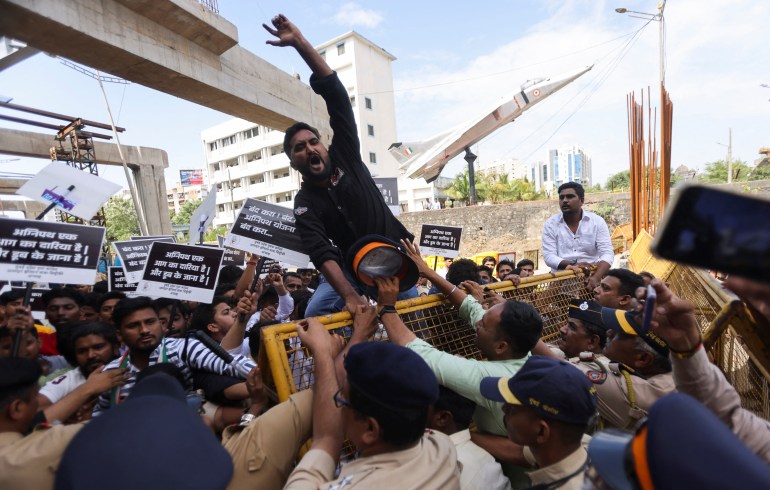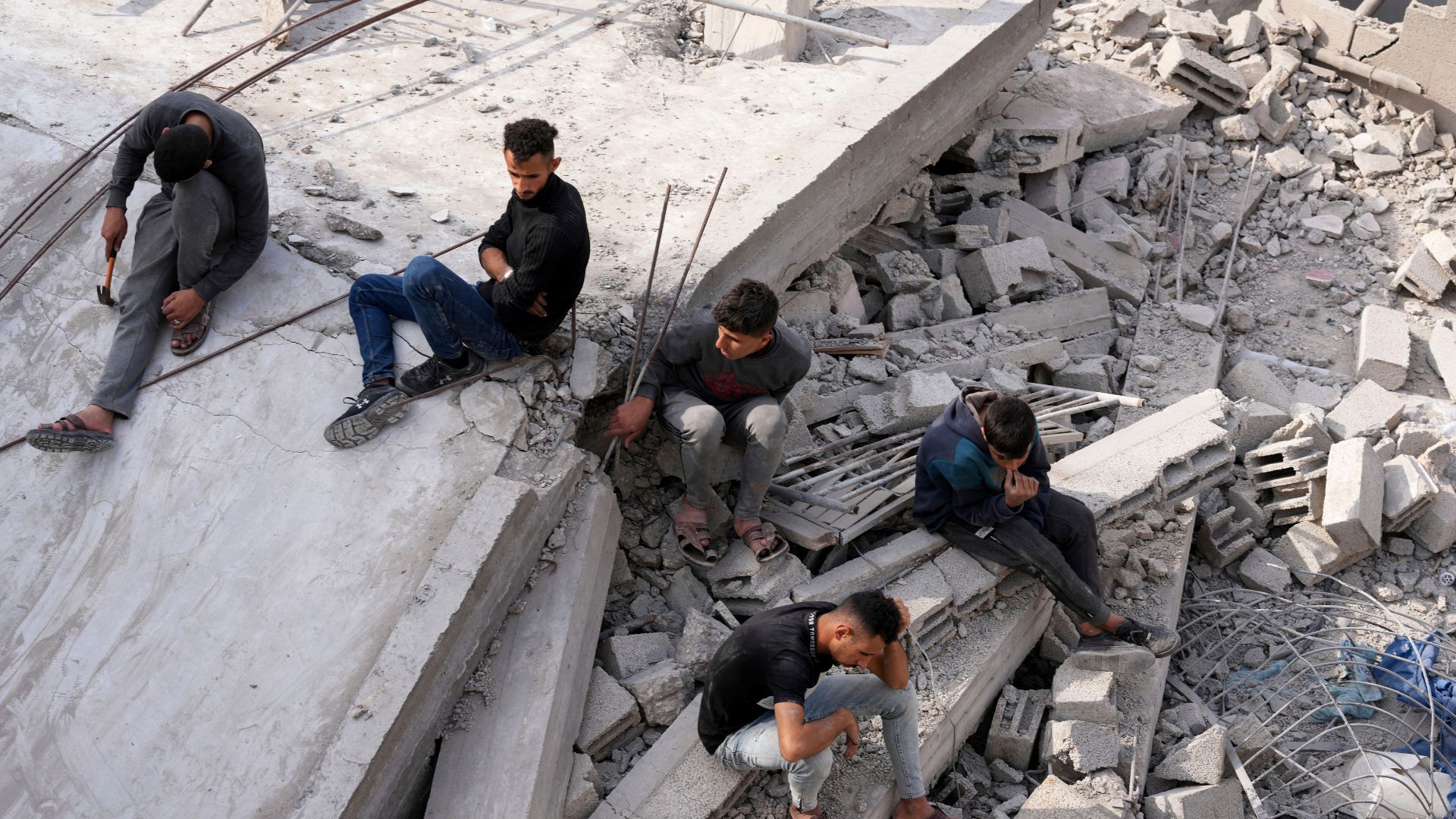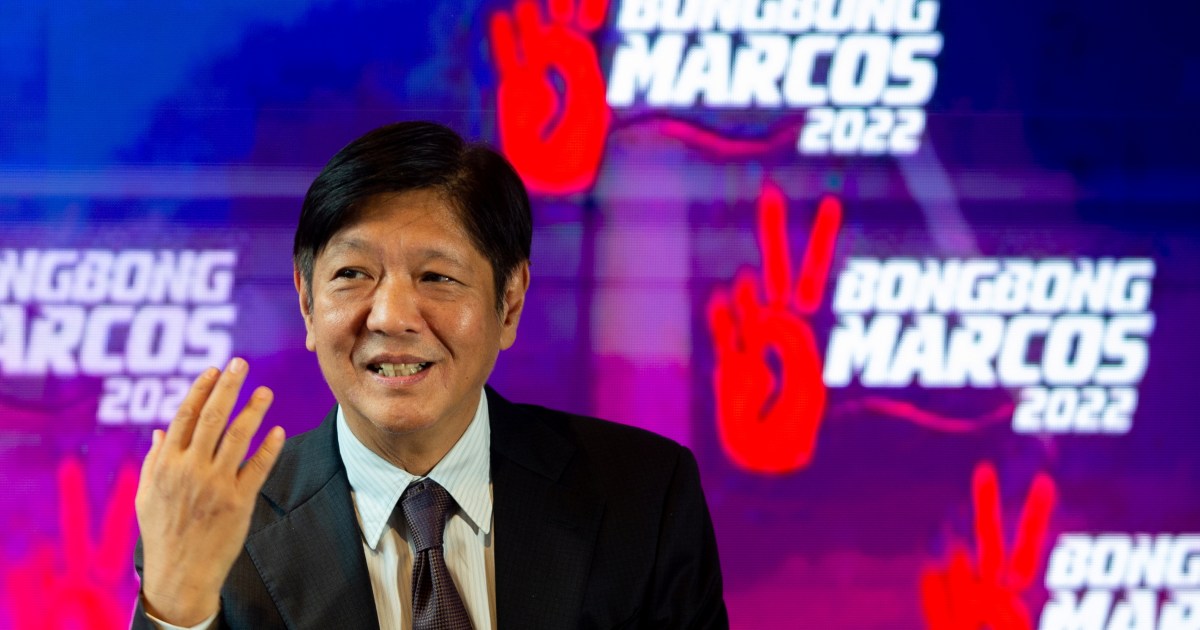‘We have been cheated’: India’s youth reject new army jobs scheme
New Delhi, India – Anger against a new army recruitment scheme has intensified across India, with crowds of protesters burning trains, blocking roads and ransacking public property to demand that the plan be rolled back.
“The protests will continue till there is a rollback. We have been cheated,” Lalit Kumar (name changed), a 19-year-old army aspirant who has been protesting for the last few days in the Begusarai district of the eastern state of Bihar, told Al Jazeera.
“There is not a single aspirant who can say that they are happy with this new scheme. So why is there a need for it?” the teenager asked.
On June 14, Prime Minister Narendra Modi’s government announced “Agnipath” (path of fire in Hindi), a policy designed to hire soldiers on four-year contracts, after which 25 percent of the best performing soldiers will be retained for longer services and the remaining 75 percent relieved from duty without any gratuity or pensionary benefits.
In a country already grappling with an unprecedented unemployment crisis, the scheme triggered widespread resentment, with thousands of young men hitting the streets, resulting in hundreds of arrests and at least one death so far.

The job scheme has also been slammed by opposition parties and defence analysts, who have warned of “devastating consequences”.
“How can you destroy an institution like the army by announcing short-term contractual positions? What will thousands of youths do after retiring in four years?” Govind Singh Chauhan, another army aspirant from Jodhpur district in the western Rajasthan state, told Al Jazeera.
Many young people, especially from the rural belts of India, depend on the army for secure jobs. With nearly 1.4 million officers on its payroll, India’s armed forces are the second-largest employer in the country after the railways.
Under Agnipath, the government aims to recruit 46,000 soldiers, called “Agniveers” (warriors of fire) this year.
In a bid to pacify the protesters, the government increased the maximum age for the scheme from 21 to 23 years as a one-time exemption this year for candidates who have been waiting for recruitment for the last two years.
Despite the concession, the anger has not subsided. A nationwide shutdown was called by the protesters on Monday, even as the Indian army issued a notification to recruit soldiers under Agnipath.
India’s economy was battered by the coronavirus pandemic, pushing a large number of Indian youth out of work. According to a report by the Centre for Monitoring Indian Economy, 53 million Indians were unemployed in December last year. The number is expected to have increased since then, adding to the anger over the army recruitment scheme.
“For the last two years, there has been no recruitment in the army and the government has blamed it on the pandemic. But wasn’t there a pandemic when they held elections and conducted huge rallies?” said Sakit, a protester in Uttar Pradesh state’s Meerut city who did not want to disclose his last name.
No debate in parliament
The government says reforms in the army are necessary to enable a “youthful profile”.
“It is envisaged that average age profile of Indian armed forces would come down by about 4-5 years by implementation of this scheme,” the ministry of defence said in a statement.

However, security experts believe the main motive behind the scheme is to avoid pensions, which constitute nearly 23 percent of defence spending.
For instance, out of the $70bn or so in India’s 2022-2023 defence budget, nearly $16bn was for the pensions. Another 29 percent of the budget is spent on salaries for active members of the army, leaving less than half of the allocated money for defence upgradation, procurements, and automation.
“Yes, there is a need to rationalise recruitment policies, fiscal resources, and individual service allocation for the Indian military but to what degree can the nation afford to mortgage combat capabilities and operational readiness to save a few thousand crores? This may be a well-intentioned policy but from the protests on the street, it is evident that it has not been holistically and rigorously reviewed,” Chitrapu Uday Bhaskar, an Indian navy veteran and director of the Society for Policy Studies, a New Delhi-based think-tank, told Al Jazeera.
“The young demography of India is desperately seeking credible employment prospects. This policy needs to be thoroughly debated in the parliament and persuasively communicated to the directly affected youth [before implementation],” he said.
Gopal Krishna Agarwal, spokesman for the ruling Bharatiya Janata Party (BJP), blamed the opposition for misleading people over the issue.
“This [violence] is unfortunate and due to misinformation that is being dished to young persons by certain political parties and people with vested interests,” he said. “The armed forces are starting the recruitment process. We expect the violence to die down.”
“The Agnipath scheme is for strengthening the armed forces and bring in a younger profile. It has been implemented with due deliberation and suggestions,” he told Al Jazeera.

‘Internal security challenges’
Deepak Kumar, a trainer who runs an institute for army aspirants in Bihar, feels the new policy has “demoralised” young people who wanted to join the army.
“Each year, some 200 young boys from my academy used to get selected. But many of those whom I am training now are no longer interested because they don’t want to retire at an early age without any economic security,” Kumar told Al Jazeera.
Kumar believes that, in the long term, the scheme may also create other social problems.
“The soldiers who will be disengaged after four years will feel demoralised and if they don’t get ample opportunities and with the arms training they have, they may well become anti-social elements,” he added.
Kumar’s fears are also echoed by many defence experts who feel the government’s attempt to find cost-cutting solutions in defence recruitment may end up “militarising” the problem.
“After a certain period of time, you will have a large number of semi-trained, semi-literate decommissioned soldiers, unable to find employment commensurate to their expectations, floating in the society,” Ghazala Wahab, defence analyst and executive editor of FORCE magazine, told Al Jazeera.
“The bitterness of their experience is likely to create greater internal security challenges.”
Wahab argues that an overwhelming majority of young people opt for military service primarily for job security and it is the rigorous training in defence academies that embeds the feelings of “protecting their motherland”.
“To expect these people to risk their lives and limb for merely a temporary experience is unfair,” said Wahab.



